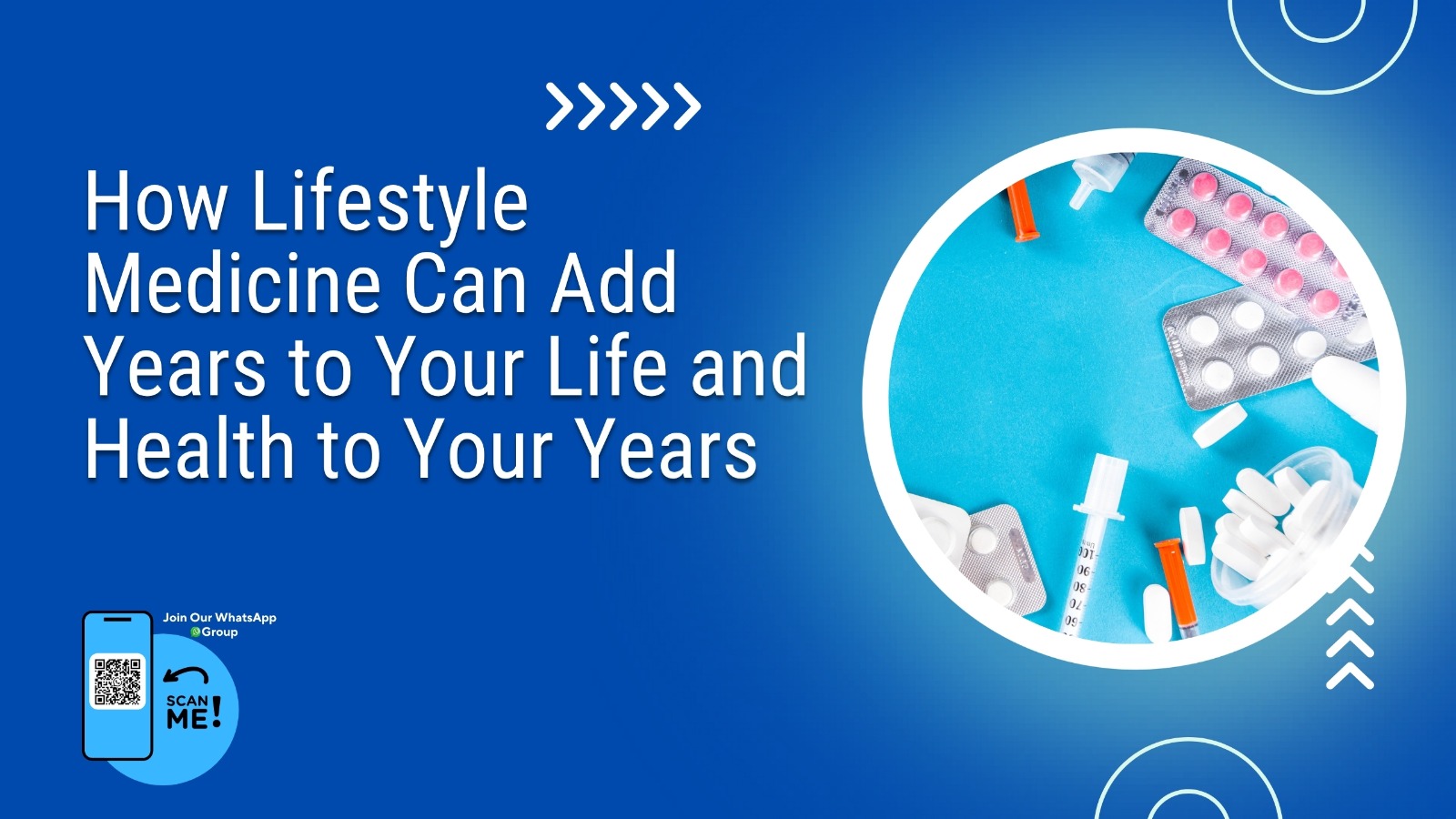How Lifestyle Medicine Can Add Years to Your Life and Health to Your Years
Written By: Dr Nandini L

Introduction: A Crisis in Health—And a Cure Within Reach. Modern medicine faces a paradox. While we have cutting-edge treatments and the highest healthcare spending, chronic illnesses like cardiovascular disease, cancer, and type 2 diabetes continue to rise. The root cause? A modern lifestyle is filled with poor diet, inactivity, and unmanaged stress. Enter Lifestyle Medicine—an evidence-based approach that addresses the true root of disease.
What Is Lifestyle Medicine? Unlike conventional medicine, which often focuses on treating symptoms, Lifestyle Medicine focuses on preventing, managing, and reversing chronic diseases through daily habits. It emphasizes six core pillars:
- Whole-food, plant-predominant nutrition
- Regular physical activity
- Restorative sleep
- Stress management
- Avoidance of risky substances
- Positive social connections
Why Are We Getting Sicker? Cardiovascular disease and cancer now account for more than 50% of deaths in the U.S. The Western lifestyle—marked by sedentary behavior, processed foods, and chronic stress—is primarily to blame. Our health is deteriorating despite our wealth and technology.
The Preventable Epidemic: Inflammation, Obesity, and Type 2 Diabetes. These three conditions form a vicious cycle, fueling each other and leading to premature death. But they’re not inevitable. Studies show that over 80% of chronic diseases are preventable with proper lifestyle changes.
The Cost of Inaction Chronic illnesses are not only devastating to individuals—they’re financially unsustainable. Our current healthcare system is being crushed by diseases that are, in many cases, avoidable. Implementing lifestyle medicine can drastically reduce healthcare costs and improve quality of life.
The Science Behind Lifestyle Medicine Numerous studies have shown that adopting a plant-based diet, engaging in regular physical activity, and reducing stress can:
- Lower blood pressure and cholesterol
- Reverse type 2 diabetes
- Improve survival rates in cancer patients
- Reduce the risk of heart disease
The Power of Food as Medicine: A whole-food, plant-based diet fights inflammation, supports the gut microbiome, and reduces the risks of multiple diseases. It’s not just a diet; it’s a prescription for longevity.
Mental Health Matters: The Role of Emotional Resilience. Emotional resilience—the ability to bounce back from stress—is closely tied to physical health. Chronic stress, depression, and anxiety can:
- Shortened telomeres (cell aging markers)
- Increased risk of heart disease and cancer
- Weaken immune function
Lifestyle interventions like exercise, social support, and stress reduction techniques can strengthen emotional resilience and improve outcomes in chronic illness.
The Microbiome Connection: A fiber-rich diet low in processed foods supports a healthy gut microbiome. This reduces inflammation and improves mental well-being, as the gut-brain axis plays a key role in mood and cognitive function.
A Call to Action for Healthcare Professionals. The evidence is clear: Lifestyle Medicine must be integrated into standard medical practice. From nutrition education to behavioral support, we must equip doctors and patients with the tools to live healthier lives.
How Many Publications Do You Need to Match? 2025 NRMP Data Reveals the Answer
📊 Research Publications: A Key Component in Residency Applications
In the competitive landscape of residency applications, research publications play a pivotal role. The National Resident Matching Program (NRMP) provides insights into the average number of research experiences and publications among successful applicants. While the 2025 “Charting Outcomes in the Match” report has not been released yet, historical data offers valuable benchmarks.
Epicos
+5
NRMP
+5
NRMP
+5
📈 Average Number of Publications by Specialty
Based on the 2020 NRMP data, the average number of research experiences and publications for U.S. MD seniors who matched into various specialties were as follows:
foustka.com
+6
Op-Med
+6
snma.org
+6
Neurosurgery: 5.5 research experiences; 18.3 publications
Plastic Surgery: 2.43 research experiences; 14.2 publications
Dermatology: 2.55 research experiences; 14.7 publications
Orthopaedic Surgery: 1.6 research experiences; 8.2 publications
Otolaryngology (ENT): 2.76 research experiences; 10.4 publications
Op-Med
These numbers indicate that applicants to more competitive specialties tend to have higher research involvement.
🧪 Research Trends and Their Impact
The emphasis on research varies across specialties. For instance, applicants to surgical specialties often engage in more research activities compared to those applying to primary care fields. This trend underscores the importance of tailoring your research endeavors to align with your desired specialty.
Op-Med
+2
AAFP
+2
PubMed Central
+2
🎯 Strategies to Enhance Your Research Profile
To bolster your residency application:
Engage Early: Start participating in research projects during medical school.
Seek Mentorship: Collaborate with experienced researchers who can guide your work.
Aim for Quality: Focus on producing impactful research that contributes meaningfully to your field.
Present Your Work: Submit abstracts to conferences and aim for publications in reputable journals.
NRMP
+2
pahomepage.com
+2
Op-Med
+2
🌟 Conclusion
While the number of publications is a significant factor in residency applications, it’s essential to focus on the quality and relevance of your research. Engaging in meaningful research not only enhances your application but also contributes to your growth as a medical professional.
NRMP
+1
pahomepage.com
+1

